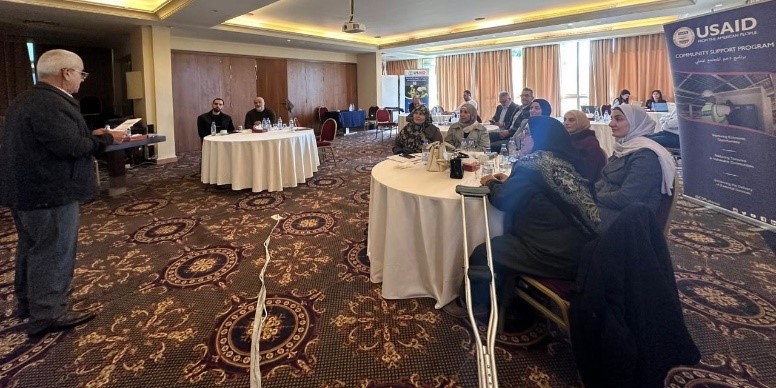CSP Enhances Collaboration and Promotes Sales Among Agricultural Cooperatives
Lebanon’s economic crisis – and its resulting currency devaluation of more than 90% and state-electricity cuts reaching 22 hours per day – has severely impacted production costs for agricultural cooperatives and small-scale farmers, leading to diminished incomes and fueling communal tensions over livelihood opportunities. In response, since 2019, the USAID-funded Community Support Program (CSP) has been supporting six agricultural cooperatives [1] by equipping them with commercial equipment such as refrigerators and ovens and providing them with safely stored agricultural equipment such as harvesters and welding machines to expand production and sales, thereby improving the livelihoods of around 1,667 farming households.
To ensure the sustainability of these interventions, CSP also trained cooperative members on food quality and processing, business and marketing plans, branding and visibility, packaging, sales, and building effective market linkages. Through this capacity building approach, the women-led agricultural cooperative in Fnaideq, for example – which was provided with a mobile kiosk in 2021 to expand its reach – sold its entire 2023 production by entering six new markets and also secured a $35,000 annual contract for pomegranate molasses with the private wholesaler Fair Trade Lebanon.
In late 2022, CSP established a Community of Practice (CoP) for cooperatives to further enhance sales by bringing together members to share best practices and lessons learned and provide a platform to connect them to new markets and selling points. The CoP had previously supported the participation of cooperatives in several marketing initiatives, including exhibitions in Hazmieh (December 2022) and Gemmayze (May 2023). To build upon these successes, On November 21, 2023, CSP kickstarted a series of four “Practice Forums” aimed at improving the coordination and collaboration between member cooperatives to benefit from a wider variety of market channels and to better answer market demand. With participation from 12 representatives of five cooperatives, the first forum provided an opportunity to establish connections among participants and identify possible networking, communication, and collaboration prospects among the benefiting cooperatives. By the end of the workshop, each cooperative had developed a plan of action for its contribution to increased sales based on its own capacity.
“This was a very beneficial and impactful session where all participating cooperatives exchanged best practices, acquired new techniques, and discussed collaboration initiatives. We had never considered that collaboration with other cooperatives could result in increased production and sales, and we are now more confident in closing financial gaps. This motivated us to market our produce more effectively”, said Joseph El Hajj, member of The Cooperative of Olive Farmers in Tanbourit.

